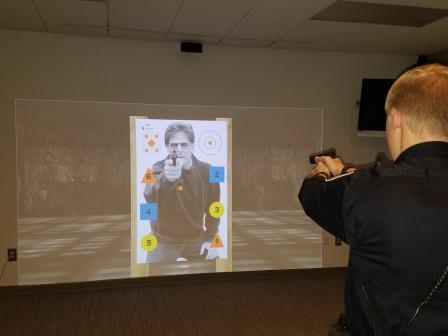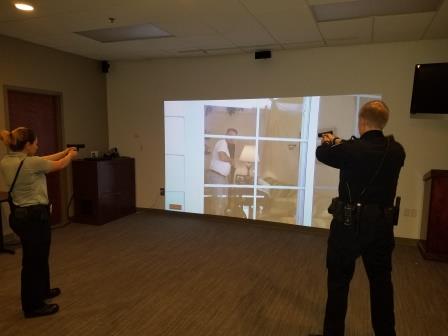The actions of law enforcement officers in our country are under intense scrutiny. Advances in camera and communication technology, especially cell phones and social media, make it easier to record and circulate video of law enforcement officers' daily interactions with the public.

A law enforcement officer uses a simulator for target practice.
Credit/City of Mauldin Police Department
This new reality poses a challenging question: How do you train, manage, and monitor the actions of law enforcement officers in a way that reduces inappropriate actions, respects civil rights, ensures officer safety, and maintains public confidence in law enforcement?
The Municipal Association of South Carolina and its Risk Management Services Department are responding to the challenge by increasing training and developing strategies to help its members prepare for the new reality. These strategies include building skills such as critical judgment and decision-making, leadership, and management.
Judgment training is crucial. Law enforcement officers must know how to handle unpredictable circumstances and when faced with hostile confrontations, be able to de-escalate situations.
The Risk Management Services department purchased a simulator to train police departments that belong to the SC Municipal Insurance Trust and SC Municipal Insurance and Risk Financing Fund. The simulator is an advanced virtual training system programmed with real-life scenarios designed to sharpen officers' situational response skills.
The portable simulator has more than 800 scenarios designed to help officers prepare for the split-second decisions they make. The scenarios have a high degree of realism and challenge the trainees' decision making ability.

Simulators allow officers to create various field scenarios.
Credit/City of Mauldin Police Department
Todd Williams, public safety loss control consultant for Risk Management Services, will oversee a train-the-trainer program for the simulator to allow member cities to conduct in-house training. The program will certify police department training officers so they can train their staff in their city.
The scenario-based training will offer other tactics for officers to consider, including various response options so officers understand how to diffuse hostile situations without physical force whenever possible.
"Most police work is 'guardian' and not 'warrior,'" said Williams. Police are called to be guardians, not full-time warriors. When officers focus on solving problems and offering public service, trust and cooperation are preserved, resulting in better services to residents.
Williams recommends departments refer to Sir Robert Peel's Nine Principles of Policing, developed in London in the early 1800s, which provides best practices for public safety risk management leadership needed in today's society.
RMS uses several training platforms to assist law enforcement departments. In addition to the simulator training program, SCMIRF members have access to more than 60 model policies and a video library developed by the Legal and Liability Risk Management Institute, addressing the critical areas of law enforcement.
LocalGovU is another online training program designed to address local government exposures. Currently there are 83 free courses approved by the S.C. Criminal Justice Academy available to officers.
But technology is just one part of training.
RMS hosts law enforcement experts each year to provide liability and leadership training.
In August, Jack E. Enter presented a leadership program challenging public safety officials to become better managers by confronting their mediocrity. Poor management, which is the key culprit, results in costly inaction in police departments, he said.
While Enter spoke about how managers can build strong professional bonds with those they supervise, the implications for risk management are clear: when leaders have the trust and respect of their staff, employees are able to communicate candidly with their superiors and work together to prevent harmful behaviors and decisions. This relationship has a direct impact on the officers' performance.
In this climate, as before, local governments must ensure that officers are trained to make good decisions. Elected officials and city management must work closely with police chiefs so that officers have the resources and training they need to carry out their duties.
For more information about law enforcement training resources, contact Todd Williams at twilliams@masc.sc or 803.354.4764.
